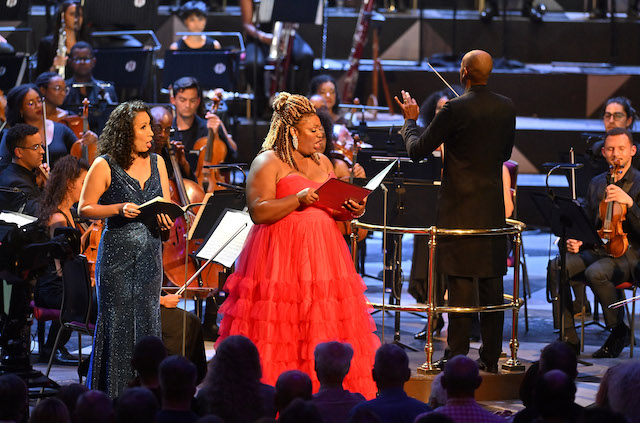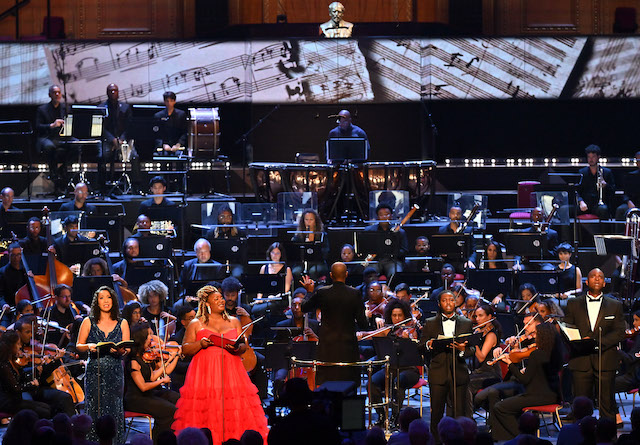Prom 61, Cabell, Chineke! Voices and Orchestra, Edusei review - a thrilling, fiercely rational Beethoven 9 | reviews, news & interviews
Prom 61, Cabell, Chineke! Voices and Orchestra, Edusei review - a thrilling, fiercely rational Beethoven 9
Prom 61, Cabell, Chineke! Voices and Orchestra, Edusei review - a thrilling, fiercely rational Beethoven 9
Crystalline clarity, and ravishing vocals from BBC Cardiff Singer of the World
Last night’s riveting, meticulous account of Beethoven’s Ninth from the Chineke! Orchestra was as daring in its restraint as it was thrillingly revelatory. Right from the subtle shimmer of the first movement’s opening cascades it was clear that this interpretation had put each bar under the microscope and found it teeming with new life.
This is, of course, not just one of Beethoven’s most famous works, it is one of his most famously difficult; Donald Tovey called it “a law unto itself”, while musicologist Nicholas Cook has written eloquently on its “diametrically opposed interpretations”. After its first shambolic performances during Beethoven’s lifetime it took decades for its reputation to recover – now it’s so familiar, the challenge is to deliver an account that feels as deftly original as it is authoritative.
The symphony also, of course, bears the scars of the ideological battles that have been fought over it throughout the generations. Now the "Ode to Joy" is the European Union’s anthem. Yet the Nazis’ attempt to appropriate it remains infamous and it’s perhaps even more relevant to the Chineke! interpretation that the rulers of the former apartheid regime of Rhodesia (now Zimbabwe) also claimed it as their own in the Seventies.
German/Ghanaian conductor Kevin John Edusai has carved out a reputation for identifying the architecture of each piece he conducts and revealing it in all its shimmering articulated glory. Beethoven 9 is at certain points so formally experimental that the danger is for it to sound chaotic and muddy. Here, however, there was never any sense of stumbling intent – if there was a criticism it was that sometimes it sounded almost too efficient. Yet that crystalline clarity really paid off, especially in the third movement where it was possible to hear influences ranging from Beethoven’s own "Pathétique" sonata to Mozart’s Serenade for 13 Wind Instruments.
The evening opened with a performance of George Walker’s Lilacs, which won the Pulitzer Prize in 1996. This setting of Walt Whitman’s elegy in memory of Abraham Lincoln forms an interesting textual companion to Schiller’s Ode to Joy; both take profound political emotions and elevate them into an expression of the sublime. The performance introduced the celebrated American soprano Nicole Cabell (pictured above on the left), whose ravishing sonorous voice swooped in counterpoint to Walker’s shivering jagged orchestration. It was an arresting opening to an evening that would prove as notable for its musical elegance as its richness.
After the agile account of Beethoven’s first movement, which built to thunderstorm intensity in the final bars, the orchestra moved to a tightly controlled molto vivace. This is the movement in which Beethoven the revolutionary painted with silence as much as with noise and Edusai’s rigorous definition paid off handsomely here. The melodic use of the drums – which would inspire composers from Berlioz to Stravinsky – was effectively and quite literally highlighted by placing the drummer separately from the rest of the percussion above the orchestra (pictured below). The tenterhook spikiness of the strings was offset by the rich lyricism of the woodwind passages.
Like an actor grappling with "To be or not to be", in the fourth movement the musicians must spend as much time avoiding cliché as excavating nuance, and this sophisticated interpretation did just that. Edusai built up the layers like a geometric puzzle so the themes glittered and refracted. Bass-baritone Ryan Speedo Green delivered a compelling opening to the dialogue before the choir, Chineke! Voices, made the Royal Albert Hall dome and auditorium resonate with the iconic harmonies. The deceptively effortless reach of Cabell’s voice made its mark here, with assured support from mezzo Raehann Bryce Davis and tenor Zwakele Tshabalala.
There were some fragile moments – including a couple of bars where the sopranos sounded slightly sharp – yet ultimately this performance demonstrated the stupendousness of Beethoven’s achievement: the fight between rationality and madness, the multiplicity of musical ideas, the reaching from a stormily imperfect world into a more exalted dimension. Cook talked about the symphony being "a construction of mirrors, reflecting and refracting the values, hopes and fears of those who seek to understand and explain it". At a time of epic geopolitical and climatic turbulence, last night Edusai revealed it yet again as a symphony for our times.
rating
Explore topics
Share this article
Add comment
The future of Arts Journalism
You can stop theartsdesk.com closing!
We urgently need financing to survive. Our fundraising drive has thus far raised £49,000 but we need to reach £100,000 or we will be forced to close. Please contribute here: https://gofund.me/c3f6033d
And if you can forward this information to anyone who might assist, we’d be grateful.

Subscribe to theartsdesk.com
Thank you for continuing to read our work on theartsdesk.com. For unlimited access to every article in its entirety, including our archive of more than 15,000 pieces, we're asking for £5 per month or £40 per year. We feel it's a very good deal, and hope you do too.
To take a subscription now simply click here.
And if you're looking for that extra gift for a friend or family member, why not treat them to a theartsdesk.com gift subscription?
more Classical music
 Kilsby, Parkes, Sinfonia of London, Wilson, Barbican review - string things zing and sing in expert hands
British masterpieces for strings plus other-worldly tenor and horn - and a muscular rarity
Kilsby, Parkes, Sinfonia of London, Wilson, Barbican review - string things zing and sing in expert hands
British masterpieces for strings plus other-worldly tenor and horn - and a muscular rarity
 From Historical to Hip-Hop, Classically Black Music Festival, Kings Place review - a cluster of impressive stars for the future
From quasi-Mozartian elegance to the gritty humour of a kitchen inspection
From Historical to Hip-Hop, Classically Black Music Festival, Kings Place review - a cluster of impressive stars for the future
From quasi-Mozartian elegance to the gritty humour of a kitchen inspection
 Shibe, LSO, Adès, Barbican review - gaudy and glorious new music alongside serene Sibelius
Adès’s passion makes persuasive case for the music he loves, both new and old
Shibe, LSO, Adès, Barbican review - gaudy and glorious new music alongside serene Sibelius
Adès’s passion makes persuasive case for the music he loves, both new and old
 Anja Mittermüller, Richard Fu, Wigmore Hall review - a glorious hall debut
The Austrian mezzo shines - at the age of 22
Anja Mittermüller, Richard Fu, Wigmore Hall review - a glorious hall debut
The Austrian mezzo shines - at the age of 22
 First Person: clarinettist Oliver Pashley on the new horizons of The Hermes Experiment's latest album
Compositions by members of this unusual quartet feature for the first time
First Person: clarinettist Oliver Pashley on the new horizons of The Hermes Experiment's latest album
Compositions by members of this unusual quartet feature for the first time
 Gesualdo Passione, Les Arts Florissants, Amala Dior Company, Barbican review - inspired collaboration excavates the music's humanity
At times it was like watching an anarchic religious procession
Gesualdo Passione, Les Arts Florissants, Amala Dior Company, Barbican review - inspired collaboration excavates the music's humanity
At times it was like watching an anarchic religious procession
 Classical CDs: Camels, concrete and cabaret
An influential American composer's 90th birthday box, plus British piano concertos and a father-and-son duo
Classical CDs: Camels, concrete and cabaret
An influential American composer's 90th birthday box, plus British piano concertos and a father-and-son duo
 Cockerham, Manchester Camerata, Sheen, Martin Harris Centre, Manchester review - re-enacting the dawn of modernism
Two UK premieres added to three miniatures from a seminal event of January 1914
Cockerham, Manchester Camerata, Sheen, Martin Harris Centre, Manchester review - re-enacting the dawn of modernism
Two UK premieres added to three miniatures from a seminal event of January 1914
 Kempf, Brno Philharmonic, Davies, Bridgewater Hall, Manchester review - European tradition meets American jazz
Bouncing Czechs enjoy their Gershwin and Brubeck alongside Janáček and Dvořák
Kempf, Brno Philharmonic, Davies, Bridgewater Hall, Manchester review - European tradition meets American jazz
Bouncing Czechs enjoy their Gershwin and Brubeck alongside Janáček and Dvořák
 Solomon, OAE, Butt, QEH review - daft Biblical whitewashing with great choruses
Even a top soprano and mezzo can’t make this Handel paean wholly convincing
Solomon, OAE, Butt, QEH review - daft Biblical whitewashing with great choruses
Even a top soprano and mezzo can’t make this Handel paean wholly convincing
 Two-Piano Gala, Kings Place review - shining constellations
London Piano Festival curators and illustrious friends entertain and enlighten
Two-Piano Gala, Kings Place review - shining constellations
London Piano Festival curators and illustrious friends entertain and enlighten
 Echo Vocal Ensemble, Latto, Union Chapel review - eclectic choral programme garlanded with dance
Beautiful singing at the heart of an imaginative and stylistically varied concert
Echo Vocal Ensemble, Latto, Union Chapel review - eclectic choral programme garlanded with dance
Beautiful singing at the heart of an imaginative and stylistically varied concert

Comments
The first three movements
Several of us in the gallery
For me it was the best